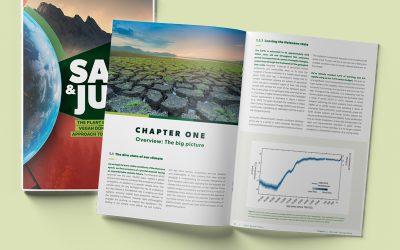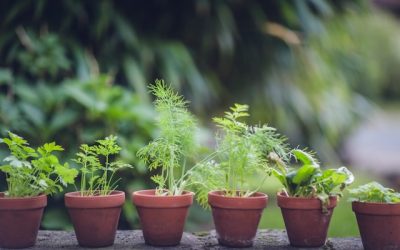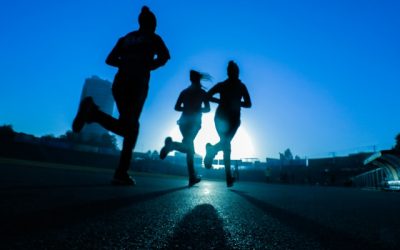Blog
Latin America: the end of drinking water in Uruguay
July 6, 2023
Until less than a month ago, Uruguay, located in South America, was known for being one of the only countries in the continent to have achieved almost universal coverage of access to drinking water.
However, despite being located on one of the largest freshwater reserves in the world, the Guarani aquifer, Uruguay is currently in the midst of a severe water crisis.
As a result of a historic drought caused by the climate crisis, a few days ago the worst possible scenario was unleashed: the end of drinking water¹ for the metropolitan area of Montevideo, where almost 70% of the country’s population resides.
The importance of considering the long-term sustainability of water use and the consequences of climate change was not foreseen. The climate emergency finally left Uruguay without any defense against the loss of a key resource that is vital for sustaining life.
At the international level and in the context of the climate crisis, water is a global concern and measures to preserve this invaluable resource are a central focus.
Water is a unique and irreplaceable resource. Access to it is a cross-cutting right as it has an immediate impact on other human rights, such as the right to health, food, education, and decent work, among others.
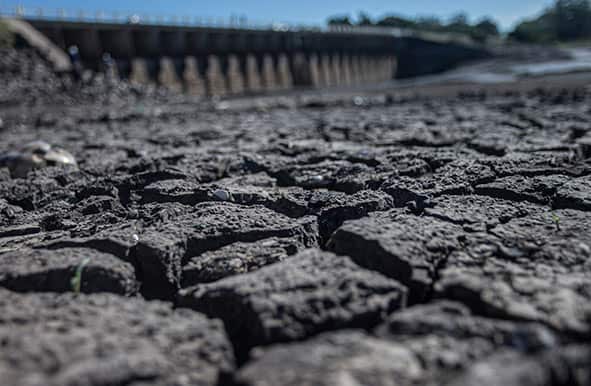
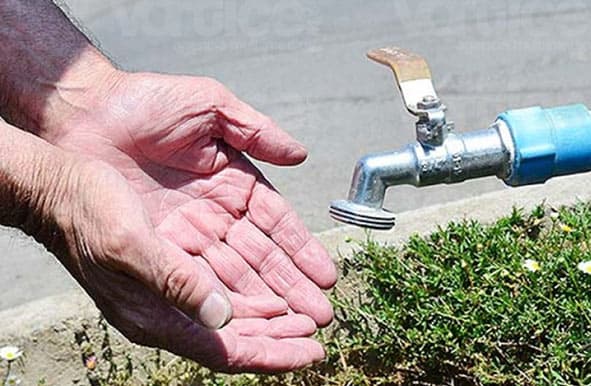
Hidden aspects of Uruguay’s water crisis
For now, the Uruguayan government is urging the population to be responsible by taking water-saving measures such as short showers and turning off the faucet when brushing their teeth. But is there anything else we can do to defend water and the right we should all have to access it?
To answer this, we first need to understand other fundamental elements of this historic water crisis.
In Uruguay, most of the water is not intended for human consumption.
In 2021, a report² was produced calculating the water footprint of the main products exported by Uruguay. It should be clarified that the water footprint is an environmental indicator that defines the total volume of freshwater used to produce the goods and services we consume. This indicator contributes to the United Nations Sustainable Development Goal for 2030³, which emphasizes the sustainable management of water and sanitation to address water scarcity globally. Among the important data to highlight, it was found that cow’s flesh for human consumption is the most exported product in Uruguay, and also the one that consumes the most water.

If we continue to delve a little deeper into animal agriculture, we will find that the average water footprint per calorie of cow’s flesh is 20 times greater than that of cereals⁴. Additionally, in Uruguay the amount of water needed to farm cows is 20 times more than the water consumed by the population⁵.
In 2006, the United Nations⁶ stated: “The animal agriculture sector emerges as one of the two or three most significant contributors to the most serious environmental problems, at all scales from local to global. The findings of this report suggest that it should be a major focus of policy attention in addressing the problems of land degradation, climate change and air pollution, water scarcity and contamination, and biodiversity loss”.
And four years later, they warned that a global shift to a plant-based diet is vital to save the world from hunger, energy poverty and the worst effects of climate change.⁷
The dark business of GM soy in Latin America
Soybean is another one of Uruguay’s most exported products with plantations in Uruguay occupying more than 60% of arable land. It takes 500 tons of water to produce one ton of soybeans⁸. Pertinent to this fact is that 77% of soybeans worldwide are used for animal feed. Soybeans are being produced in South America as a feed crop for export markets.¹⁰
The researchers of the Water Footprint in Uruguay report even point out that “although many people imagine that soy is consumed mainly by vegetarians and vegans, most of it is consumed indirectly in the form of farmed chicken, pork, beef and fish, as well as eggs, milk, cheese and yogurt”.¹¹
In Latin America, the development of soybean monocultures has led to the dispossession of land from farmers and Indigenous peoples. It has also contributed to the destruction of soils, the deforestation of native forests and problems related to public health due to toxic herbicides.
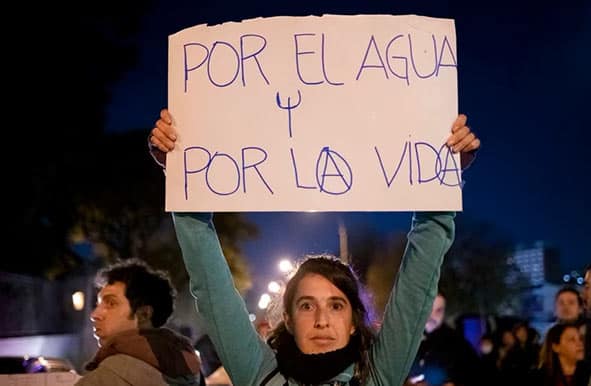
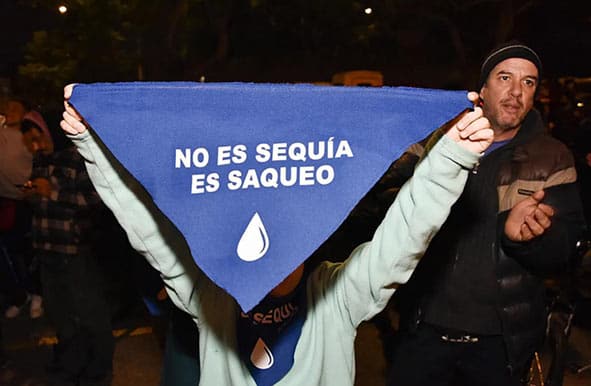
Soybean production in the region benefits a handful of multinational companies. Among them, Monsanto, which licenses its gmo seeds and sells the herbicide glyphosate which is cataloged as “possibly carcinogenic for human beings” by the World Health Organization (WHO).
A government with a political model that promotes monocultures, intensifies the use of pesticides, consolidates corporate monopolies and subsidizes one of the major culprits of climate change, animal agriculture, should be a thing of the past.
We have the right to know
Among the other three products that consume the most water for their production are dairy products. Dairy production not only consumes a large amount of water, but can also generate a high degree of pollution. Cellulose and rice are the other main products exported by Uruguay that also involve intensive water consumption although far less than cow’s flesh and soy.
Awareness of the Water Footprint of different products, services and companies worldwide is growing. For example, Peru has a Water Footprint Program “Blue Certificate” developed by the National Water Authority, which is required of companies supplying the state.
The water footprint label placed on products can help influence consumer choices.
Plant Based Treaty solutions on how to defend water

According to the United Nations, 1.4 million people die annually and 74 million will see their lives shortened by diseases related to poor water, sanitation and hygiene.¹²
Plant Based Treaty is a global campaign that puts food systems at the center of the fight against the climate crisis and makes 3 demands that come to solve this problem.
Relinquish, the first of the Treaty’s demands, relates directly to global water scarcity and its sustainable use. Under the maxim “no land use change, including deforestation, for animal agriculture”, we demand a halt to the expansion of animal agriculture, which has been a trigger for water misuse and the water crisis in Uruguay.
Animal flesh production is one of the most destructive elements of the human footprint on the planet.¹³
According to the European Commission’s Joint Research Center¹⁴, a plant-based diet uses five times less water than a diet based on animal flesh.
Additionally, producing one burger of animal flesh requires 1,695 liters of water, while burgers made from grains and vegetables require up to 95% less water.
We are facing a climate emergency! Food security must be a priority for everyone with a focus on making water and nutritious food accessible.
That is why eliminating the driving forces of the problem by redirecting and promoting plant-based foods is part of the second demand of the Plant Based Treaty. Through campaigns on the environmental advantages and health benefits of plant-based food, we help to transition different key actors in society such as schools, hospitals, nursing homes, prisons, and government institutions.

It is time to redirect public subsidies from animal agriculture, slaughterhouses, and industrial fisheries towards organic, plant-based food production to build resilience and mitigate climate change.
But we also need to recover and restore key ecosystems and reforest the land and focus on nature-based solutions to mitigate and adapt to climate change–-our third and last demand.
In Uruguay, Plant Based Treaty has been working with the environmental development department of the city of Montevideo and the network of environmental promoters of the Ministry of Environment, as well as several local environmental and human rights organizations. In turn, since its inception in August 2021, it has been increasing its outreach by working with restaurants and tourism companies to implement local vegan dishes, and through raising public awareness at festivals, concerts and various cultural events.
There is an urgent need to accelerate change; water affects everyone, so we all need to take action. Today, more than ever, we need to understand the environmental impact of our diet and move towards a plant-based, sustainable food system, for water, for life!
As there are problems, there are solutions, and we are all part of the solution.
Are you ready to take action and join the fight for a more sustainable future? If so, we invite you to join your local Plant Based Treaty team today. Simply fill out our application form and you’ll receive an invite to join one of our Friday introductory calls. See you there!
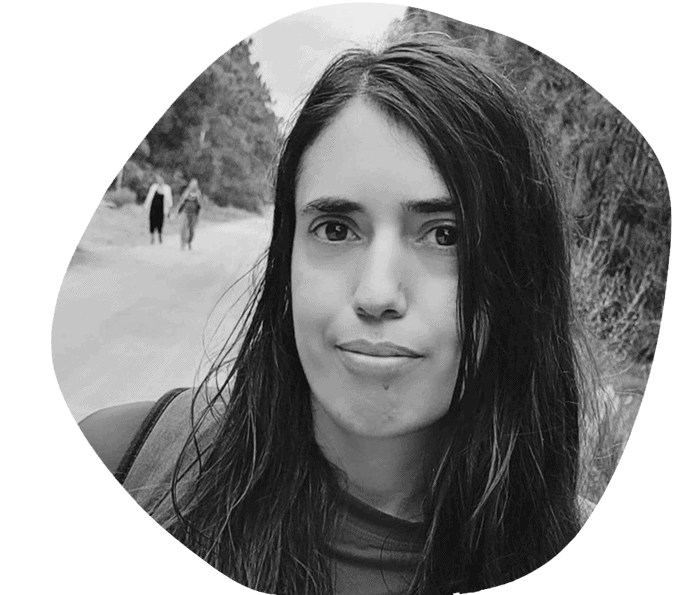
Azul Cardozo is a Latin American lawyer and activist who studies and exposes the relationship between speciesist oppression and human rights violations in Latin America. She founded and organizes several local and international collectives, marches and conferences throughout the region, working intensively for the empowerment of the activist community with Plant Based Treaty and Animal Save Movement in South America.
References
1) Kostas Eleftheratos, George Tselioudis, Christos Zerefos, Panagiotis Nastos, Costas Douvis & Ioannis Kapsomenakis, “Observed and predicted climate changes in Uruguay and adjacent areas”, Hellenic Journal of Geosciences, vol. 45.:
https://www.academia.edu/15790628/Observed_and_predicted_climate_changes_in_Uruguay_and_adjacent_areas
2) Transforming our world: the 2030 Agenda for Sustainable Development, United Nations, 2015.: https://sdgs.un.org/2030agenda
3) The green, blue and gray water footprint of farm animals and animal products. Mekonnen, M y Hoekstra, A. UNESCO-IHE Institute for Water Education, 2010: https://digitalcommons.unl.edu/cgi/viewcontent.cgi?article=1075&context=wffdocs
4) Agua que no has de beber, Luciano Costabel, Brecha, Mayo 5, 2023.: https://brecha.com.uy/agua-que-no-has-de-beber-2/
5) Livestock’s long shadow. FAO.org, 2006: https://www.fao.org/3/a0701e/a0701e00.htm
6) UN urges global move to meat and dairy-free diet, The Guardian, June, 2010:
https://www.theguardian.com/environment/2010/jun/02/un-report-meat-free-diet
7) Soy: food, feed, and land use change, Fraanje, W. y Garnett, T. , Food Climate Research Network, University of Oxford.(2020): https://www.tabledebates.org/sites/default/files/2021-12/FCRN%20Building%20Block%20-%20Soy_food%2C%20feed%2C%20and%20land%20use%20change%20%281%29.pdf
8) Cultivos transgénicos en América Latina: expropiación, valor negativo y Estado, Lapegna, Pablo y Gerardo Otero, Estudios Críticos del Desarrollo, Zacatecas, Universidad Autónoma de Zacatecas, 2016: https://let.iiec.unam.mx/node/4442
9) Huella hídrica en Uruguay. Potencial impacto en los sectores agroindustriales exportadores, Ximena Gómez y Agustín Inthamoussu, mayo de 2019.: https://www.uruguayxxi.gub.uy/uploads/informacion/77ed3ef6cc0b8f3e9ef5fdeaa0211828caa389cb.pdf
10) La explotación industrial de animales está acabando con el agua”, Paulina Quintana, Noviembre 8, 2018, Mercy for Animals.: https://mercyforanimals.lat/blog/la-explotacin-industrial-de-animales-est-3/
11) World Water Day, United Nations, March 23, 2023.: https://www.un.org/en/observances/water-day
12) ¿Qué hay dentro tu hamburguesa? Más de lo que piensas”, United Nations, Naciones Unidas, Noviembre 8, 2018.:https://www.unep.org/es/noticias-y-reportajes/reportajes/que-hay-dentro-tu-hamburguesa-mas-de-lo-que-piensas
13) The water footprint of different diets within European sub-national geographical entities”.Vanham, D., Comero, S., Gawlik, B.M. et al. Nat Sustain: https://waterfootprint.org/resources/Vanham-et-al-2013_2.pdf
14) “La explotación industrial de animales está acabando con el agua”, Paulina Quintana, Noviembre 8, 2018, Mercy for Animals: https://mercyforanimals.lat/blog/la-explotacin-industrial-de-animales-est-3/
More from the blog
6 Important Calls To Action From The Safe And Just Report – Part One
By Miriam Porter
Grow Your Own Kale And Spinach For Healthy Green Smoothies
By Miriam Porter
The Importance Of Exercise And Tips On Building Muscle
By Miriam Porter

